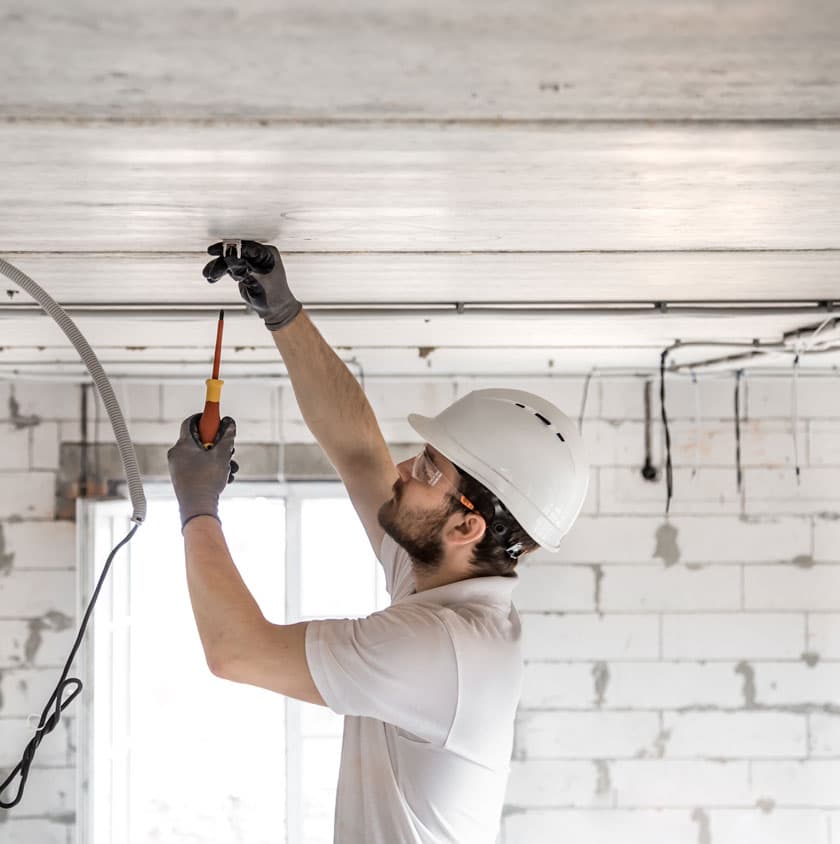
Electrician Insurance
Compare Electrician Insurance Quotes
- Complete one short form
- Quickly compare quotes
- Find a great deal today!

Compare insurance quotes from UK’s leading electrician insurers including:
Why Compare Electrician Insurance Quotes At SimplyQuote.co.uk?
Finding the right electrician insurance shouldn’t take hours — or cost more than it needs to.
At SimplyQuote, we’ve partnered with Quotezone to bring you quick, side-by-side comparisons from a panel of tradesmans insurance providers. Instead of starting from scratch with multiple brokers, you enter your details once and see a tailored list of policies that suit your work, risk level, and business structure.
This isn’t a one-size-fits-all platform. Whether you’re wiring a domestic property or managing commercial installations, the system filters quotes based on the type of electrical work you carry out — from small-scale repairs to contract jobs involving staff or subcontractors.
The result? More relevant cover, fewer surprises, and the ability to make an informed decision in minutes — not days.
It’s a smarter way to shop for electrician insurance, built for professionals who don’t have time to chase down policies or decipher legal jargon. Compare once, choose well, and get back to the job.
What Do I Need to Get a Quote?
You’ll need your business details, trade type, turnover, cover level, and any past claims to get an accurate electrician insurance quote.
The process takes under five minutes and helps insurers tailor your policy to your specific risks.
You’ll be asked for:
- The type of electrical work you carry out (e.g. domestic, commercial, or both)
- Whether you’re self-employed, part of a company, or hire subcontractors
- Your business postcode and trading name (if applicable)
- Annual turnover and number of employees (if any)
- The level of public liability cover you want — commonly £1M, £2M, £5M or £10M
- Whether you need extras like tool cover, employers’ liability, or personal accident cover
- Any past claims, ongoing legal issues, or previous insurance refusals
These details help insurers tailor quotes to your actual risk profile. For example, a self-employed electrician working solo on domestic callouts poses a very different risk to a team wiring new-builds on commercial sites.
The more accurate you are, the more accurate your quote will be. And if you’re not sure about something — like which cover level to pick — the comparison process guides you along the way, so you’re not left guessing.
Why Do I Need Electrician Insurance Cover?
Electrician insurance protects you from financial losses if something goes wrong on the job — whether that’s an accident, injury, property damage, or legal claim.
Without cover, even a simple mistake could cost thousands and disrupt your ability to work.
Working with electricity carries inherent risk. You might accidentally drill through a customer’s water pipe, suffer an injury on-site, or be blamed for a fire caused by faulty wiring. Any of these situations could lead to claims, compensation demands, or legal action — and without insurance, you’re personally liable.
Public liability is especially important. It’s not just there to tick a box — many clients, contractors, and site managers won’t let you start work without proof of cover. And if you employ anyone, even part-time, employer’s liability is a legal requirement.
Even if you’re a sole trader handling small domestic jobs, you’re not exempt from risk. Tools can be stolen. Jobs can go wrong. Someone could trip over a cable and file a claim. With the right cover in place, you’re not just protecting your income — you’re protecting your reputation, your clients, and your ability to keep trading confidently.

What Insurance Do Self-Employed Electricians Need?
Most self-employed electricians need at least public liability insurance to protect against injury or property damage claims — and many also add tool cover and personal accident insurance.
The right policy depends on how and where you work.
Even if you don’t have employees, you’re still liable if a client trips over your equipment, if a property is damaged during a job, or if someone accuses you of poor workmanship. Without cover, any of those incidents could mean paying legal fees or compensation out of your own pocket.
Here’s what many self-employed electricians include in their policy:
- Public liability insurance — to cover claims from third parties (this is the most essential).
- Tool cover — especially if your tools are expensive or stored in a van overnight.
- Personal accident cover — to help with income if you’re injured and unable to work.
- Professional indemnity — optional, but helpful if you give advice or design services as part of your work.
If you occasionally bring in subcontractors, even on a casual basis, you’ll also want to look at employer’s liability — which can become a legal requirement depending on how they’re classified.
Don’t assume that “tradesman insurance” doesn’t apply to you because you’re solo. The risk is still real — and a tailored policy is often surprisingly affordable.
Does Electrician Insurance Cover Subcontractors Or Apprentices?
Electrician insurance doesn’t automatically cover subcontractors or apprentices — you’ll need to declare them and meet certain conditions for them to be included.
If you don’t, your policy could be invalidated when you need it most. Let’s break it down.
If you hire apprentices, they’re typically treated like employees — which means you’re legally required to have employer’s liability insurance, even if they’re part-time or unpaid. Most insurers will ask about apprentices specifically during the quote process, so be upfront to make sure they’re covered.
Subcontractors are more complex. There are two main types:
- Labour-only subcontractors — work under your supervision, use your tools, and follow your hours. These are usually considered employees in the eyes of insurers and must be covered by your policy.
- Bona fide subcontractors — work independently, use their own tools, and carry their own insurance. You typically don’t need to cover them, but you may need to check or record their insurance details to avoid liability.
What Does Electrician Insurance Cover Include?
Electrician insurance usually includes public liability, tools cover, employer’s liability (if you have staff), and often personal accident or legal expenses protection.
Each element is designed to protect against different risks that come with electrical work.
Let’s break it down:
- Public liability insurance covers injury or property damage to third parties. This is the backbone of most policies — essential if you’re working in homes, businesses, or public spaces.
- Tools and equipment cover protects against theft, loss, or damage — whether the tools are in your van, on-site, or in storage. Many claims are made for stolen tools, particularly overnight.
- Employer’s liability is legally required if you employ anyone. It covers you if a staff member is injured or becomes ill due to their work.
- Personal accident cover can provide a payout if you’re hurt and can’t work. For sole traders, this can be vital to cover living costs while recovering.
- Legal expenses insurance may be bundled in to help with contract disputes, tax investigations, or defending claims.
Coverage will vary depending on the insurer, but most policies allow you to customise based on the size and nature of your work. For example, a domestic electrician may not need the same protection levels as a commercial contractor with multiple employees.

What’s Not Included?
Electrician insurance policies don’t cover everything — and knowing what’s excluded is just as important as what’s included.
Common exclusions include tool theft from unlocked vehicles, damage from faulty workmanship, and working at extreme heights without prior declaration.
Here are a few examples to watch for:
- Wear and tear — Tools, cables, and equipment that break down over time due to regular use won’t be covered.
- Unattended or insecure storage — If your van isn’t locked or parked securely overnight, tool theft claims may be rejected.
- Undeclared subcontractors — Many policies only cover direct employees. You’ll need to declare subcontractors and ensure they’re licensed and insured.
- Work at height or depth — Standard policies often exclude work above a certain height (e.g. 15 metres) or below ground unless specified.
- Faulty workmanship — Damage caused by poor-quality work or design isn’t covered unless you’ve added professional indemnity.
- Illegal or unauthorised activity — Any criminal or deliberately negligent behaviour automatically voids cover.
This is where policy documents matter. Two quotes might look similar, but exclusions can make a big difference when you need to claim. If your work involves non-standard risks — like solar installations or commercial rewiring — it’s worth checking the fine print or calling the insurer before buying.
How Much Does Electrician Insurance Cost?
Electrician insurance typically starts from around £50 to £100 per year for basic cover, but the total cost depends on your trade setup, level of risk, and policy extras.
Larger or higher-risk businesses may pay several hundred pounds more.
Pricing is never one-size-fits-all — and for good reason. A domestic electrician working solo on light installations doesn’t pose the same level of risk as a team handling industrial rewiring projects or high-voltage systems.
Here are the main factors that influence price:
- Type of electrical work — Working in commercial or hazardous environments usually costs more than domestic jobs.
- Business size — More staff or subcontractors means higher premiums, especially if you need employer’s liability.
- Public liability limit — Cover levels of £5 million cost more than £1 million, but may be required for certain contracts.
- Tools and extras — Adding tool cover, personal accident protection, or legal expenses will raise your premium.
- Claims history — Previous claims can increase your price, even if they were small.
- Location — Areas with higher rates of tool theft or injury claims can push costs up.
If you’re only looking for core liability protection, your quote may sit at the lower end. But if your work involves valuable tools, employees, or complex projects, investing in broader cover is usually worth the added cost.
How Can I Save Money On Electrician Insurance?
You can save money on electrician insurance by tailoring your cover to your actual risk, comparing quotes from multiple providers, and avoiding unnecessary extras.
But the goal isn’t to go cheap — it’s to spend smarter.
Start with your liability limit. Many electricians default to £5 million in public liability, but if you only work on smaller domestic jobs, £1 million or £2 million may be more than enough. Likewise, if you’re not employing staff, you can skip employer’s liability — which brings your premium down significantly.
Tool cover is another area to assess. If you’re using high-value equipment daily, it’s worth paying for protection. But if your tools are low-risk or already covered elsewhere (e.g. via a business policy or premises insurance), you might be doubling up.
Increasing your excess can also reduce your monthly or annual cost — just make sure the saving outweighs the risk of a higher out-of-pocket payment if you ever need to claim.
Lastly, insurers reward low-risk businesses. Keeping a clean claims history, storing tools securely, and operating in a safer environment can all help reduce what you pay — both now and at renewal.
How To Compare Electrician Insurance Quotes Online
Comparing electrician insurance at simplyquote.co.uk is quick, tailored, and designed for tradespeople who want clear options — fast.
You’ll answer a few simple questions, then see side-by-side quotes from UK insurers who understand your line of work.
Here’s how it works:
- Enter your trade and business details
Tell us what kind of electrical work you do, whether you’re self-employed or run a team, and where you’re based. - Choose the cover you need
Select the level of public liability cover, tool protection, employer’s liability (if needed), and any extras like personal accident cover. - Get instant quotes
See real-time prices and policy features from our panel of trusted insurers — no need to phone around or fill in multiple forms. - Compare policies side by side
Review what’s included, check policy limits, and see which extras are available — all laid out clearly so you can choose confidently. - Apply online with your chosen insurer
Once you’ve found the right fit, you’ll head straight to the insurer’s site to complete the application. No pressure, no pushy calls — just a smooth finish.
This process is powered by our partnership with Quotezone and built to make comparing electrician insurance as efficient as the work you do.
Frequently Asked Questions
Yes. Even if you work alone, you’re still responsible for accidents, injuries, or damage caused by your work. Most clients expect proof of insurance before hiring you.
It depends on your contracts. Domestic electricians often choose £1M or £2M cover, while commercial work may require £5M or more.
Public liability isn’t legally required, but it’s strongly advised. Employer’s liability is a legal requirement if you employ staff — even part-time.
Not by default. Most policies only cover direct employees. You’ll need to declare subcontractors and check they meet the insurer’s conditions.
Yes, but you may pay more. Some insurers specialise in higher-risk applicants, so it’s worth comparing quotes carefully.
Usually only if your tools are stored securely — like in a locked van with approved locks or a secure building. Always check the policy terms.
In most cases, cover can start immediately after you’ve completed the quote and payment. Documents are usually emailed within minutes.
Yes, most insurers offer monthly instalments. Just note that you might pay slightly more overall than paying annually upfront.
Written by Chris Richards
Page last reviewed on 27th March 2025 by Chris Richards
